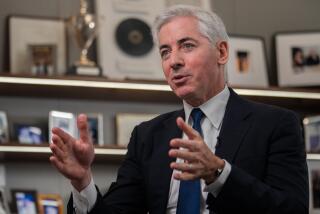Altman Resigns Over Whitewater : Probe: Deputy Treasury secretary is the highest-ranking victim of the controversy. The department’s top lawyer is also expected to step down.
- Share via
WASHINGTON — Deputy Treasury Secretary Roger Altman, facing intense criticism from Congress for his role in the Whitewater affair, resigned Wednesday, becoming the Clinton Administration’s highest-ranking victim of the controversy.
President Clinton accepted Altman’s resignation after Democratic leaders on Capitol Hill made it clear to the White House and to Treasury Secretary Lloyd Bentsen that they believed Altman’s credibility with Congress had been irreparably damaged.
Late Wednesday, Bentsen recommended to Clinton that Treasury Undersecretary Frank Newman be nominated to succeed Altman. Newman is a former vice chairman of Bank of America who in his current post has been overseeing financial and banking policy issues.
In addition, Administration sources said Treasury general counsel Jean Hanson, who was also caught up in the controversy because of her testimony during congressional hearings, earning Altman’s enmity for contradicting his statements, will resign soon--perhaps as early today.
Treasury Chief of Staff Joshua L. Steiner, the third senior Treasury official under fire from Republicans in the controversy, will stay on at the department, sources said.
Altman’s resignation as the Treasury Department’s second-highest official had been widely anticipated since he was forced to endure 16 hours of testimony during the House and Senate Whitewater hearings, grilled by angry lawmakers over what both Democrats and Republicans charged was his lack of candor with Congress.
In his letter of resignation to the President, his old college classmate from Georgetown University, Altman said he hoped that “my stepping down will help to diminish the controversy.”
The former Wall Street investment banker, who first worked at the Treasury Department in the Jimmy Carter Administration, added that he regretted “any mistakes or errors of judgment I may have made.”
Altman noted that his resignation would be effective after his successor is confirmed by the Senate. Treasury officials said it was unclear whether Altman plans to return to Wall Street, however.
Clinton, who talked with Altman by telephone before the resignation was announced, wrote in a letter to him: “I believe you have taken the right step under the circumstances and I regretfully accept your resignation.” Clinton added that Altman “had made many valuable contributions to this Administration.”
Altman’s congressional critics from both parties praised his decision to step down. Democrats made it clear that they believed his effectiveness in dealing with Congress on key legislative matters was at an end.
“Mr. Altman’s ability to serve the President had been damaged and I support his decision to resign,” said Sen. Donald W. Riegle Jr. (D-Mich.), the chairman of the Senate Banking, Housing and Urban Affairs Committee, which conducted the Whitewater hearings in the upper chamber. “The situation is unfortunate and regrettable.”
Republicans, however, were far less sympathetic and appeared gleeful over helping to pressure Clinton to abandon one of his oldest friends in the Administration. And Altman’s resignation seemed to renew their desire to stay on the offensive on the Whitewater matter. “Today’s announcement is a welcome action that is long overdue,” said Sen. Christopher S. Bond (R-Mo.), a Republican member of the banking panel. “While a step in the right direction, I believe we’ve only scratched the surface and much remains to be learned before all of the questions are answered.”
Sen. Alfonse M. D’Amato (R-N.Y.), the ranking Republican on the Senate committee and Altman’s most vocal critic in Congress, said simply: “It’s about time Altman resigned.”
Altman is the third high-ranking Administration official to be forced out recently. White House Counsel Bernard Nussbaum resigned under fire in March for his controversial handling of Whitewater matters after the suicide of Deputy White House Counsel Vincent Foster.
Associate Atty. Gen. Webster Hubbell, a former law partner of First Lady Hillary Rodham Clinton, also resigned in March after their former Little Rock, Ark., law firm began an ethics investigation into Hubbell’s past billing practices. The inquiry appeared to be prompted in part by the intense scrutiny the firm was under as a result of its own role in the Whitewater controversy.
The resignation of the 48-year-old Altman is a severe blow to Clinton. Altman had been widely viewed both inside and outside the Administration as one of the President’s most effective and able advisers. He played an influential role on a wide range of policy fronts--from the budget to trade to health care reform--and appeared to be on track to succeed Bentsen as Treasury secretary.
Largely because of Altman’s energy, political skills and close ties to the President, the Treasury Department became one of the bright success stories of Clinton’s first year in office.
The President relied on Bentsen and Altman to take on some of his Administration’s toughest tasks. Altman ran the White House “war room” during last summer’s congressional battle over Clinton’s economic plan and helped push the North American Free Trade Agreement through Congress.
During the 1993 economic summit in Tokyo, Altman acted as a key trade negotiator with Japanese officials and helped close a deal on a new framework for future trade negotiations. Both Bentsen and Altman stepped into the breach on health care just as the Administration’s plan began to come under attack in Congress and around the country this year.
But Altman’s political demise came as a result of yet another task he was asked to perform for the Administration: running the Resolution Trust Corp., the agency that supervises cleanup of the savings and loan failures of the 1980s.
When the Administration’s initial candidate to take over the regulatory agency failed to win confirmation last year, Altman was named acting RTC chairman while continuing to serve in the No. 2 Treasury job.
He was thus put in the awkward role of running an independent regulatory agency that was conducting a criminal investigation of Madison Guaranty Savings & Loan, a failed Arkansas thrift owned by James B. McDougal. McDougal was the partner of then-Gov. Clinton and his wife in the Whitewater real estate development in northwest Arkansas.
The government is investigating whether the Whitewater project caused losses at Madison Guaranty and whether federally insured deposits from the thrift were siphoned off through the development to benefit Clinton’s 1984 gubernatorial campaign.
Altman, while wearing two hats, was involved in daily meetings with White House officials on sensitive political matters in his role as an appointee at the Treasury Department.
He came under fire in Congress--both before and during the Whitewater hearings--because of contacts between the White House and the Treasury Department concerning the RTC’s confidential investigation into Madison Guaranty.
Former Whitewater special counsel Robert B. Fiske Jr. cleared Altman and other Treasury and White House officials of criminal wrongdoing in their discussions of the matter and the Office of Government Ethics also said Altman did not violate government ethics rules.
But Altman’s critics in Congress argued that the Treasury official repeatedly failed to disclose to them the full scope of the contacts, especially during an initial hearing in February, when the contacts were first revealed.
At that first hearing before the Senate banking panel, Altman acknowledged just one contact. But he was forced to repeatedly amend his more recent testimony to reveal additional contacts. And White House officials testified during this summer’s hearings that they realized last February that Altman had not fully disclosed to the committee what he knew.
In addition, Hanson, who helped Altman at the RTC while continuing to work at the Treasury Department, also sharply contradicted Altman during the hearings. She came under fire for meeting last September with Nussbaum to inform him that the RTC was preparing to issue a criminal referral to the Justice Department that would name President Clinton’s 1984 gubernatorial campaign as a possible beneficiary of criminal acts at Madison Guaranty.
Altman stressed that he was not aware of that meeting. Hanson said Altman suggested that she meet with Nussbaum. And she made it clear that she believed that Altman knew more about the initial Treasury-White House contacts than he had said.
More to Read
Sign up for Essential California
The most important California stories and recommendations in your inbox every morning.
You may occasionally receive promotional content from the Los Angeles Times.










